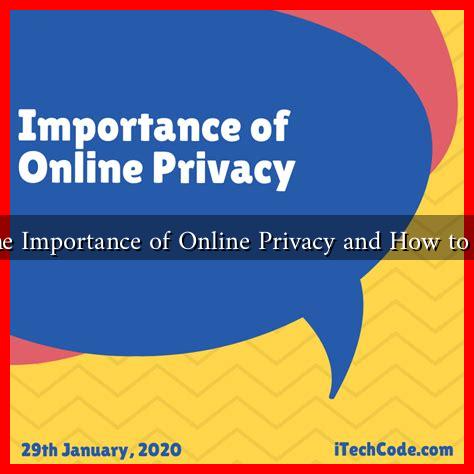-
Table of Contents
What Is the Importance of Online Privacy and How to Ensure It?
In an increasingly digital world, online privacy has become a critical concern for individuals and organizations alike. With the rise of social media, e-commerce, and cloud computing, personal data is more vulnerable than ever. This article explores the importance of online privacy and offers practical tips on how to safeguard it.
The Significance of Online Privacy
Online privacy refers to the ability of individuals to control their personal information and how it is collected, used, and shared online. The importance of online privacy can be understood through several key points:
- Protection from Identity Theft: Personal information such as Social Security numbers, credit card details, and addresses can be exploited by cybercriminals. According to the Federal Trade Commission (FTC), identity theft affected over 1.4 million people in 2020 alone.
- Preservation of Personal Freedom: Privacy is essential for freedom of expression. When individuals feel that their online activities are being monitored, they may self-censor, limiting their ability to express opinions freely.
- Data Security: Companies collect vast amounts of data, often without explicit consent. A breach can lead to significant financial loss and reputational damage. For instance, the 2017 Equifax data breach exposed the personal information of 147 million people.
- Consumer Trust: Businesses that prioritize online privacy are more likely to gain consumer trust. A survey by Cisco found that 84% of consumers care about their online privacy, and 49% would stop using a service if they felt their data was not secure.
Common Threats to Online Privacy
Understanding the threats to online privacy is crucial for effective protection. Some common threats include:
- Phishing Attacks: Cybercriminals use deceptive emails or websites to trick individuals into providing personal information.
- Malware: Malicious software can infiltrate devices, stealing sensitive data without the user’s knowledge.
- Data Mining: Companies often collect and analyze user data for targeted advertising, which can lead to privacy violations.
- Public Wi-Fi Risks: Using unsecured public Wi-Fi networks can expose users to hackers who can intercept data transmissions.
How to Ensure Online Privacy
While the threats to online privacy are significant, there are several effective strategies individuals can employ to protect themselves:
- Use Strong Passwords: Create complex passwords that include a mix of letters, numbers, and symbols. Consider using a password manager to keep track of them.
- Enable Two-Factor Authentication: This adds an extra layer of security by requiring a second form of verification, such as a text message code, in addition to your password.
- Be Cautious with Personal Information: Limit the amount of personal information shared on social media and other online platforms. Review privacy settings regularly.
- Use a Virtual Private Network (VPN): A VPN encrypts your internet connection, making it more difficult for hackers to intercept your data, especially on public Wi-Fi.
- Regularly Update Software: Keeping your operating system, browsers, and applications updated helps protect against vulnerabilities that could be exploited by cybercriminals.
- Educate Yourself: Stay informed about the latest online privacy threats and best practices. Resources like the Electronic Frontier Foundation (EFF) provide valuable information on privacy protection.
Conclusion
Online privacy is not just a personal concern; it is a fundamental right that impacts our freedom, security, and trust in digital platforms. As technology continues to evolve, so do the threats to our privacy. By understanding the importance of online privacy and implementing effective strategies to protect it, individuals can safeguard their personal information and enjoy a more secure online experience. Remember, in the digital age, being proactive about privacy is essential for protecting not just yourself, but also your community.
For more information on online privacy and security, consider visiting the Electronic Frontier Foundation.

